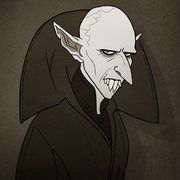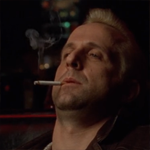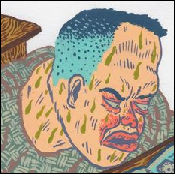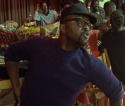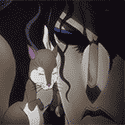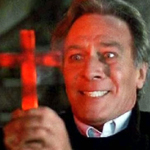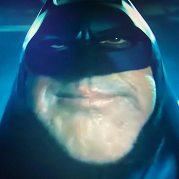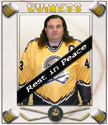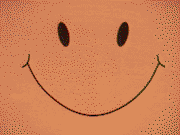|
I've been watching a lot of older movies to fill in gaps in my film history, and as I work my way through a lot of Ford/Wayne stuff, I'm struck by how the old White Hat/Black Hat cowboy movie just feels childish to me, no matter how seriously the material takes itself. And I realized, it's because I've already seen Unforgiven, the western that completely ends the idea of the classic western. It's a crossing-the-Rubicon film; once it was released, it completely obviated the need for movies made before it in its genre to exist. Cabin in the Woods is a similar but more direct critique of horror (specifically slashers) that says out loud that if 'nubile teens getting chopped up by a monster' is all you've got, you should just not exist/not bother with making a movie. And I'm curious if these Rubicon films actually changed filmmaking, similar to the way Dr. Dre's The Chronic was literally the death knell of the positive afrofunk hip-hop of Tribe and De La Soul, loudly announcing that the game had been changed and audiences just weren't buying it anymore. Obviously it isn't 1:1, and Unforgiven came out well after westerns had left cinemas, and slashers keep getting made (because they're stupidly cheap and thus profitable), but I'm curious if this theory holds any merit and deserves more thought, that particular movies have effectively ended an entire genre (or forced every future movie to at least address it).
|
|
|
|

|
| # ? May 14, 2024 20:28 |
|
It was satire but Walk Hard: The Dewey Cox Story effectively laid bare the musician biopic formula so much that I can no longer take any of them seriously, because they all seem like they are copying it.
|
|
|
|
Shrecknet posted:And I realized, it's because I've already seen Unforgiven, the western that completely ends the idea of the classic western. It's a crossing-the-Rubicon film; once it was released, it completely obviated the need for movies made before it in its genre to exist. Unforgiven's great, but it isn't really subverting or deconstructing the western in any way that a ton of movies in the 60's and 70's didn't already do. If you haven't, check out Sam Peckinpah's stuff - he runs the gambit from elegaic rejections of the classic western to full on horror movie nihilism. Also, even beyond Sergio Leone, there were a lot of spaghetti westerns that did similar things, usually with a more political bent - Sergio Sollima and Sergio Corbucci's stuff is especially worth checking out.
|
|
|
|
Pretty sure it is in fact Blazing Saddles that killed the western OP.
|
|
|
|
I believe the phrase "Revisionist Western" is the popular term to describe westerns that went against the black hat white hat type of westerns of the era, I first heard it used to describe the novel Warlock by Oakley Hall which was made into a film in 1959, seems to be a pretty early example of this type of thing
|
|
|
|
Honestly the idea of the Western being "killed" is sort of an oversimplification. The genre absolutely went through a decline but no one movie was ever responsible. "Traditional" Hollywood westerns where there are clear good and bad guys (and even this is bundling a bunch of stuff together) were kind of on the way out in the 60s, and that tracks with loosening censorship standards (remember under the Procuction Code you couldn't show the law defeated), a burgeoning movement questioning the predominant narratives of American progress, and also the Spaghetti Western which embraced a rawer, more amoral tone. Into the 70s there are actually quite a few notable westerns, from Eastwood's early films as director, to stuff like The Shootist, to Butch Cassidy and the Sundance Kid, etc. And there's Heaven's Gate. While that film was under development UA released Comes A Horseman which flopped, so they got nervous about Westerns in general. Cimino took his original script (then called The Johnson County War) and tried to make it less western-y and more like a grand historical saga of American life, etc. But of course in the run-up to release, film magazines and such still considered it an attempt to revive and modernize the Western in the wake of the New Hollywood, so when it flopped hard that REALLY made everyone wary of bankrolling Westerns. (There was also around this time a Lone Ranger movie that was largely compromised by some really bad publicity when the studio went after the guy who'd played the Ranger on TV using the show's name for public appearances, and it looked like they were trying to deprive an old man of his only source of income.) Still even in the 80s, Young Guns happens and makes a good amount of money. After Unforgiven, Maverick came out and was a light comedy Western that also made a lot of money. (And in this time Westerns were ALL OVER TV, with the Gambler films and Lonesome Dove and so on.) Now through this you still have some cultural changes, newer generations have different kinds of stories to grow up with so they don't have the same attachment, there's the growing recognition of the Native Americans as still-extant people who were not well treated back then (there are some classic Westerns that are sympathetic to the Indians but in a "disappearing people whose way of life is long gone" kind of way), and the colonialist narrative in general falling more into question. But it's a question now that Westerns have become sparse enough that each one's performance is seen as a referendum on the genre, as opposed to the time when if a Western flopped there'd be another one opening next week so who cares. Like obviously a big movie can be very influential and genres change over time, but it's rarely about One Movie.
|
|
|
|
Pet peeve, feel free to ignore Westerns were deconstructing the stereotypes about Western heroes forever. John loving Wayne made multiple films like that, ffs. They made movies like that in black and white, even. Unforgiven was real good but its rep is hilariously overblown, as if nobody thought of moral ambiguity in movies with horses until Clint Eastwood showed up.
|
|
|
|
Ibexaz posted:I believe the phrase "Revisionist Western" is the popular term to describe westerns that went against the black hat white hat type of westerns of the era, I first heard it used to describe the novel Warlock by Oakley Hall which was made into a film in 1959, seems to be a pretty early example of this type of thing What people often leave out is the context of "Westerns" here, Western wasn't just a movie genre, they were extremely popular on the radio and early television, magazines, digest publications, etc.
|
|
|
|
Shrecknet posted:Cabin in the Woods is a similar but more direct critique of horror (specifically slashers) that says out loud that if 'nubile teens getting chopped up by a monster' is all you've got, you should just not exist/not bother with making a movie. Also, I suspect the western genre died due to oversaturation more than anything. There isn't much room for variety.
|
|
|
|
IShallRiseAgain posted:Also, I suspect the western genre died due to oversaturation more than anything. There isn't much room for variety.
|
|
|
|
IShallRiseAgain posted:Cabin in the Woods wanted to be a "Rubicon" film, but really most people liked it because of all the fun monsters including a bunch of Easter Eggs. Its message wasn't exactly ground breaking either and it delivered it really poorly. The speech at the end was more for the subtext of the film than the text of a film. The stakes are much higher than just making a cliche horror film, but the character makes an argument like the results of their actions would just be a bad film being released. I think I disagree with how meaningful the concept of a "genre ending film" is. It's definitely hallowed and revered by cultural critics, to the point that wannabe strivers like Whedon will try to make one, but I don't think it holds up to scrutiny. A lot of it feels like an ex post facto label rather then a contemporary feeling, and relies too much on unfalsifiable statements or judgements about contemporary audience sentiment. The datapoint used is always sales, but I don't think sales are necessarily as meaningful as they are treated. E. otoh, Gooble Rampling posted:It was satire but Walk Hard: The Dewey Cox Story effectively laid bare the musician biopic formula so much that I can no longer take any of them seriously, because they all seem like they are copying it.
|
|
|
|
Regardless of the "let's do something new" posturing at its end, Cabin in the Woods really felt more like a celebration of horror tropes rather than some scathing critique. And almost exactly a year after Cabin in the Woods' release a completely earnest Evil Dead remake came out and proved more popular, so if it was really meant to cross the Rubicon it was toothless in the extreme. In the case of westerns, I agree they mostly faded out on their own rather than having "been killed" by anything, but you could make the case Blazing Saddles delivered its death notice.
|
|
|
|
Famethrowa posted:E. otoh, Musical biopics are still incredibly popular, tho. Hell, one of the best-received movies this year is a biopic of Elvis. So, I don't think Walk Hard put the genre to bed at all.
|
|
|
|
April Fool's Day (1986) did some of the same stuff like 25 years earlier. A lot of times there are earlier rubicon films that aren't as well-known. The trick to avoiding any rubicon films is to just watch a few thousand films from the 1920s and 1930s I suppose. Shrecknet posted:but I'm curious if this theory holds any merit and deserves more thought, that particular movies have effectively ended an entire genre (or forced every future movie to at least address it). I'd say in the short-term in specific cultures and markets this is true. In the long-term across the whole world I don't know if there's any film that's that big. Zogo fucked around with this message at 21:05 on Oct 31, 2022 |
|
|
|
The Jazz Singer ending silent films and (to a lesser extent) Star Wars completely upending sfx in movies feel like the only two movies that big, but those are technical Rubicons, not story ones.
|
|
|
|
Those are influential ones although a lot of big silent films were released in the years after The Jazz Singer. There were also a zillion low budget sci-fi things released after Star Wars too. It might've even increased the number of them IDK. And neither obviates the entire genre beforehand except for very casual viewers maybe. Although do really young people even watch Star Wars any longer? IDK. There was a similar discussion about this stuff in another thread a few months back and someone mentioned how younger people haven't seen and don't know anything about monumental films (for a certain age bracket) like The Matrix and Pulp Fiction.
|
|
|
|
westerns died when the first cowboy said "western's not dead"
|
|
|
|
Saying a film obviates the need for the previous works is facile, but I think if you rework the thesis a little you can get closer to the truth. "A Rubicon Film is one that fundamentally changes the way that we view the Genre". One could previously just view a classic western and have a good time watching White Hats kill Black Hats, now in a post Revisionist Western world the viewer is forced to contend with realities the Revisionist Western explored. There's a few ways that one could do that. 1. Is the type that think the classic western is obsolete, the thinking being that if a work is built on a fundamentally racist and sexist view of America then that work itself is inherently tainted unless it tries to grapple with that in some way. Thus the need to watch a film like Stagecoach is unwarranted. This type can end up throwing out the baby with the bathwater, throwing out entire Oeuvres and Movements for their transgressions. 2. Is the type that can no longer view the works in sincerity. It's a very Irony poisoned Gen X type that might not have moral issues with the content, but cannot place themselves into the intended audience role of viewing the Good Guys as good and the Baddies as bad. Heroic speeches are laughed at, moments of levity laughed at with condescension, and lack of violence and consequence mocked. The kind of people who will consider Stagecoach "Goofy" or "Cheesy" without seeing how insane some of the stunts are. 3. The third is the type to dismiss all criticism of the sort and throw in some words like "For it's time" or "In Context". They can still watch Stagecoach and believe Wayne is a cool guy and the Natives evil baddies, enjoy the stuntsmanship, and appreciate the social commentary that Ford was making. This is probably the "best" type to be, but the myopia of context can blind the viewer to properly analyzing and understanding the film. At the worst this type can end up taking some insane positions like calling Song of the South fine, because it wasn't controversial for it's time. Ignoring that it was even at that time, and you need to get that to properly understand the film. For actual examples I think Once Upon a Time in America is the end of the Gangster Epic. Scorsese certainly tried to show the rapacious cruelty and futility of the Gangster lifestyle, but his exuberance in doing so still made it feel glamorous and exciting. OUTA strips anything remotely attractive to the prospect of crime from the film. The characters are violent, cruel, stupid people without any sense of self control. Their existence is nothing but a blight on the communities they inflict themselves on, and in the end they're taken out like the trash they are.
|
|
|
|
Bit of a mental jerk-off here on my part but I would maintain that there was no real such thing as a Western "genre" (wait wait wait please don't skewer me yet!) What I mean to say is that yeah there's Westerns but they are all really just adventure or drama or action movies that take place in a fictionalized Western setting. They lean heavily on shared cultural illusions about that setting, and once a movie like Unforgiven comes out and says "yeah that setting you're using is a bunch of happy horseshit lies" well...if it's high profile enough then we can get a sort of mass awakening. I would expand this further to say that even "modern" movies take place in these fictionalized settings full of these cultural illusions and I imagine that over the coming centuries they'll be demolished too. New cultural illusions will take their place. I can already see this happening; I've been around long enough to see decades that I experienced become fictionalized. Some of today's teens say "Oh I love the 80s" and they have no freakin' idea what they're talking about. It's all just third hand osmosis through cultural relics of the era and trope-collections like Stranger Things. I don't bare them any ill-will, I really don't, and their cultural mirage is way better than the reality - but it's still a mirage. Just some brain droppings dribbling out. Carry on.
|
|
|
|
A lot of people have used comic book / superhero movies as the modern equivalent of the Western, specifically in terms of their ubiquity and (presumed) sudden disappearance, and it had its own Rubicon Films - specifically a Rubicon Year in 2008, with The Dark Knight and Iron Man / The Incredible Hulk. With The Dark Knight, you suddenly have people taking superhero stuff seriously as "real" movies - the kind of thing that can be nominated for an Oscar outside of a technical category. And on the Marvel side of things, you have the birth of the "Cinematic Universe" idea, where movies are treated more like big-budget serials that make the audience feel obligated to keep watching, even if a particular episode isn't something they would otherwise care about. I think we're definitely coming due for another Rubicon Film for the genre though. Watchmen came out a decade or two too early, but the box office Goliath that these things have become are going to attract some Davids eventually.
|
|
|
|
Robot Style posted:I think we're definitely coming due for another Rubicon Film for the genre though. Watchmen came out a decade or two too early, but the box office Goliath that these things have become are going to attract some Davids eventually.
|
|
|
|
Megaman's Jockstrap posted:Bit of a mental jerk-off here on my part but I would maintain that there was no real such thing as a Western "genre" (wait wait wait please don't skewer me yet!) What I mean to say is that yeah there's Westerns but they are all really just adventure or drama or action movies that take place in a fictionalized Western setting. I'm no expert at all but I'll push back on this a little. Westerns tend to be these odd drama/thriller/action/adventure hybrids that are incredibly broad and hard to pin down but distinguishable. You can in fact make a western that doesn't take place in the old west (first one that comes to mind is Outland, the sci-fi remake of High Noon-- maybe you wouldn't get away with placing it on the westerns shelf, but you watch it and it's like "yeah, that's a western."). On the same note, as broad as the genre is, I don't think you can just throw any kind of movie into the old west and have it necessarily be a western without qualifying it. The setting's important, but it's important because it allows for particular types of stories like a landlord threatening to evict a family from their home that's 80% melodrama and morality play but ends in a huge long violent and action-packed shootout sequence between the landlord and his goons against the family and their band of allies including a grizzled drifter and a noble Cherokee and it all feels completely natural without any tonal whiplash at all. SidneyIsTheKiller fucked around with this message at 03:19 on Nov 2, 2022 |
|
|
|
Shrecknet posted:I've been watching a lot of older movies to fill in gaps in my film history, and as I work my way through a lot of Ford/Wayne stuff, I'm struck by how the old White Hat/Black Hat cowboy movie just feels childish to me, no matter how seriously the material takes itself. Strongly recommend checking out The Great Silence (1968).
|
|
|
|
The major difference between the superhero film and the western is that the former is mostly confined to AAA-level blockbusters based on existing and recognized IP from one of two comics publishers- you get your Marvel movies and your DC movies and the occasional indie riff. Whereas with Westerns, they were being made at all levels most of the time, from big sweeping prestige epics to mid-and-low-budget fare made to fill space on a slate down to Poverty Row. The sheer saturation came from Westerns being kinda easy to make- the movie industry was based in LA which had a lot of desert and scrubland you could shoot in without going very far, nobody cared if you re-used the same Western town set or the Spahn ranch, and there was a sort of ecosystem even with actors and stuntmen, there was a steady supply of people who'd learn to fall off a horse or do rope tricks so you'd have your extras. (A bit like Hong Kong cinema and the steady stream of actors who could do convincing martial arts stunts.)
|
|
|
|
Shrecknet posted:this is Brightburn erasure I feel like Brightburn and stuff like The Boys or Invincible are definitely starting to move towards that big watershed moment for the genre, but they haven't quite had the impact that those 2008 movies did. Who knows - maybe the Rubicon Film that makes people look at those sprawling cinematic universes and say "what were we thinking?" will come from inside the MCU itself. After all, the thing that killed Batman movies for a decade and a half wasn't some parody or deconstruction, it was Batman & Robin.
|
|
|
|
I think zombie movies and media are an interesting way to look at this idea. The Walking Dead has made me feel like the old-fashioned use of the zombie in movies and TV has completely run its course. And I don't just mean the shambling, slow-moving type; even fast zombies feel basically the same, just a little scarier. So much of the popularity of zombie stuff feels tied to the whole "prepper" apocalypse conspiracy-theory mindset, and these days that just feels patheric. I liked but didn't love Army of the Dead, and just watched the The Sadness, and I feel like both those movies understand that you have to do something really different to make a "zombie" movie stand out these days. Make them more of a different species, give them a developing culture, leave the intellect intact, whatever... but I think you're kind of doomed if your zombies feel like they could have come from The Walking Dead. So I consider TWD a Rubicon show not because it's good, but because it represents the peak of that kind of lame overuse of a certain image The Sadness is obnoxiously offensive to the point that I wouldn't blame people for writing it off, but if you compare it to #Alive, another recent Korean movie with a similar-sounding premise that uses "generic" zombies, the former actually stands out in my mind instead of being "yet another zombie movie." Martman fucked around with this message at 09:20 on Nov 2, 2022 |
|
|
|
Robot Style posted:A lot of people have used comic book / superhero movies as the modern equivalent of the Western, specifically in terms of their ubiquity and (presumed) sudden disappearance, and it had its own Rubicon Films - specifically a Rubicon Year in 2008, with The Dark Knight and Iron Man / The Incredible Hulk. With The Dark Knight, you suddenly have people taking superhero stuff seriously as "real" movies - the kind of thing that can be nominated for an Oscar outside of a technical category. And on the Marvel side of things, you have the birth of the "Cinematic Universe" idea, where movies are treated more like big-budget serials that make the audience feel obligated to keep watching, even if a particular episode isn't something they would otherwise care about. Sadly it was pulled off the internet (for the sake of publishing in print, I think), but forums alum Penismightier had a very nice blog post on why Superheroes are not the new Westerns. From what I remember, he took Westerns to be defined, in part, by highly similar plots or stories (I forget which), which then managed to use different settings/scenarios to say something fundamental about some idea of "America." Superhero films didn't show either such consistency or such insight, and he said they were better thought of as the modern sword and sandal films where the attraction was seeing an expensive production where Known Guy A teams up with Known Guy B. The actual inheritor of the mantle of Westerns were romantic comedies. A lot of the major romantic comedies certainly seem to have a "meta" element to them, but I wonder if there's room for some kind of "rubicon film" specifically for something like Hallmark movies. Probably takes someone more familiar with Hallmark movies to say something intelligent about that.
|
|
|
|
SidneyIsTheKiller posted:I'm no expert at all but I'll push back on this a little. Westerns tend to be these odd drama/thriller/action/adventure hybrids that are incredibly broad and hard to pin down but distinguishable. You can in fact make a western that doesn't take place in the old west (first one that comes to mind is Outland, the sci-fi remake of High Noon-- maybe you wouldn't get away with placing it on the westerns shelf, but you watch it and it's like "yeah, that's a western."). On the same note, as broad as the genre is, I don't think you can just throw any kind of movie into the old west and have it necessarily be a western without qualifying it. Yeah, I feel like the key defining feature of the genre is the colonialist fantasy of bringing order to a wild, lawless land. That's why you can transpose the basic story idea of 'lawman hunts outlaw' to modern-day San Francisco, get Dirty Harry (or any of the cop movies that followed in its wake), and still have something that's very recognizable as a Western. And it's why you couldn't take, I dunno, My Best Friend's Wedding, set it in the old West and come away with something that really feels like a Western despite the setting. You can rebut and subvert that fantasy, like most Westerns from the late 60's onwards, but it's not really a Western if it's not about that in some way.
|
|
|
|
Quintessential example of this being Assault on Precinct 13 and (especially) Fort Apache, The Bronx.
|
|
|
|
Black Lighter posted:Yeah, I feel like the key defining feature of the genre is the colonialist fantasy of bringing order to a wild, lawless land. That's why you can transpose the basic story idea of 'lawman hunts outlaw' to modern-day San Francisco, get Dirty Harry (or any of the cop movies that followed in its wake), and still have something that's very recognizable as a Western. And it's why you couldn't take, I dunno, My Best Friend's Wedding, set it in the old West and come away with something that really feels like a Western despite the setting. You can rebut and subvert that fantasy, like most Westerns from the late 60's onwards, but it's not really a Western if it's not about that in some way. I get what you’re saying but I think the setting goes a long way imo. I heard an interview with W Earl Brown where he was telling a story about how David Milch overheard him call Deadwood a western and went off on him saying something like “No! This show isn’t a western, I hate westerns! Those movies are all about imperialism and manifest destiny, this show is about how diverse communities will cleave together in the face of adversity etc etc etc.” Then W Earl Brown is like “yeah, but I’m wearing cowboy boots and a gun  “ “
|
|
|
|
Megaman's Jockstrap posted:I would expand this further to say that even "modern" movies take place in these fictionalized settings full of these cultural illusions and I imagine that over the coming centuries they'll be demolished too. New cultural illusions will take their place. I can already see this happening; I've been around long enough to see decades that I experienced become fictionalized. Some of today's teens say "Oh I love the 80s" and they have no freakin' idea what they're talking about. It's all just third hand osmosis through cultural relics of the era and trope-collections like Stranger Things. I don't bare them any ill-will, I really don't, and their cultural mirage is way better than the reality - but it's still a mirage. Yes, this is the future: 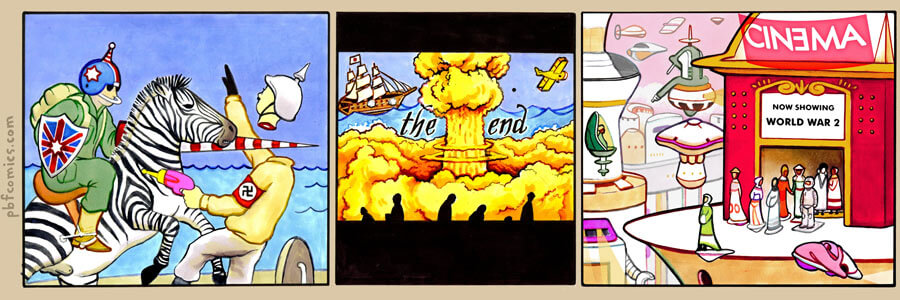
|
|
|
|
I don't know that I believe "rubicon films" exist in the context of genre, but I think they might in the context of technology. Nobody makes silent films any more except as an extremely deliberate statement, and you could probably point to specific talkies that hammered that particular coffin shut. I admit I'm not really sure which films those would be, although hopping over to color vs. black and white you could probably point to The Wizard of Oz.
|
|
|
|
I'm curious Schrecknet what westerns you've been watching, because I think one of the biggest misconceptions is that the genre wasn't self-critical from the beginning. While there was certainly a huge industry for on-the-cheap western films that fit that kinda of narrow White Hat/Black Hat binary sense of good and evil, so many of the classics of the genre explicitly do probe the morality and ramifications of westward expansion and what it says about America, colonialism or human nature. The Searchers, for example, is hailed as a masterpiece precisely because it picks apart the racism of the genre and the country, depicting John Wayne's Ethan Edwards as a miserable bigot consumed by hatred. The final shot of the film, him standing in the doorway, is as famous as it is for just what it's communicating. Here is a man left in the past, who has no place in the modern world but whose only place is in an undeveloped past. Note he wears a black hat in this one. But that's just one famous example. There's The Ox-Bow Incident, which explores mob mentality and social hysteria leading to violence. Shane is one of the most direct precursors to Unforgiven, a multilayered look at how violence destroys a man's ability to form permanent relationships. Johnny Guitar is a queer-coded story of dominant women in the West. Vera Cruz, a boiling, mean and cynical film about violence that lays the work for The Wild Bunch and the Spaghetti Western a decade later. Bad Day at Black Rock, a modern day western noir about an entire town implicated in a hate crime. Even from the earliest days of the genre movies like Francis Ford's The Invaders were making it clear the U.S. Army, not the Native Americans, were the intruding force, and small movies like To the Last Man looked at generational grudges and morality. All of these films, by the way, are pre-1960 and the beginning of the Revisionist Western period. Unforgiven is a great film, certainly. And its context as a late film from an icon of the genre reflecting on his role in perpetuating a toxic image of masculinity and violence is significant to why it works. But it's not necessarily covering too much ground thematically that the genre hadn't explored since it began. It's a mistake to presume the western wasn't self-aware or was in any way primitive prior to the Revisionist period.
|
|
|
|
Tuxedo Catfish posted:I don't know that I believe "rubicon films" exist in the context of genre, but I think they might in the context of technology. Nobody makes silent films any more except as an extremely deliberate statement, and you could probably point to specific talkies that hammered that particular coffin shut. I admit I'm not really sure which films those would be, although hopping over to color vs. black and white you could probably point to The Wizard of Oz. Black and White was still widely accepted up through the mid-60s and it was television adopting color that caused it and the networks were less in interested in showing older B&W films and it largely was cause they recognized audiences simply preferred color. I believe 1961 was the last year the majority of Hollywood productions were in B&W but 1966 was when it became a mandate.
|
|
|
|
Robot Style posted:I feel like Brightburn and stuff like The Boys or Invincible are definitely starting to move towards that big watershed moment for the genre, but they haven't quite had the impact that those 2008 movies did. Who knows - maybe the Rubicon Film that makes people look at those sprawling cinematic universes and say "what were we thinking?" will come from inside the MCU itself. After all, the thing that killed Batman movies for a decade and a half wasn't some parody or deconstruction, it was Batman & Robin. I'm not so confident that it will. Marvel will likely poke fun at their tropes when Deadpool is back in their stable, but the likes of She-Hulk showed that Marvel are pretty happy just being "cute" occasionally. If anything, I reckon we'll see someone else take a stab at Watchmen first, but it'd be a different movie if it was in dialogue with superhero movies than the pretty straight, but hollow, adaptation we got a decade ago. As for Cabin in The Woods, I liked that film, but I've never felt like Joss Whedon liked or understood horror very well. He really wants to say something about the whole final girl/slasher cycle with both Buffy and CitW, but that's a really narrow take on the genre. CitW came out on the back of what, about a decade of zombie, found footage, possession/haunted house and torture movies - and that's just the mainstream at the time.
|
|
|
|
The problem with stuff a lot of “self-aware” superhero stuff like Deadpool is that it’s not actually deconstructing anything, rather it’s mocking surface level tropes the audience is already in on. So it’s funny when a superhero, say, embraces hyper violence or mocks a cliche of the genre — but it’s not actually reconciling with the deeper themes of the genre. It’s all just fanfare that’s ultimately celebrating the genre, a big giant jerkoff session. Compare that with the original Watchmen book that seeks to truly invert and probe the ideas driving these heroes: What would true all powerful omnipotence mean for a man, what would some ordinary dude who throws on a mask and goes around beating up those he considers vulgar and criminal actually be like, what would once celebrated “heroes” become once they hung up the cape, etc. Watchmen effectively closed the book on the genre over 30 years ago but we’ve just been cycling through the same basic ideas ever since and so much of what people took away from it was the exact wrong idea — we need to make heroes gritty and serious, heroes should be hosed up losers — but doing that in effect just makes them cooler for much of the audience and defeats and lacks any true gravitas. I mean the most subversive thing you could do with Superman today is to have a movie where he’s an upstanding citizen fighting for Truth, Justice and the American Way without any sneering cynicism driving it.
|
|
|
|
TrixRabbi posted:I mean the most subversive thing you could do with Superman today is to have a movie where he’s an upstanding citizen fighting for Truth, Justice and the American Way without any sneering cynicism driving it.
|
|
|
|
Airplane! deserves a mention for "Rubicon" films. I killed the Airport series so bad, no one's ever tried to reboot it.
|
|
|
|
TrixRabbi posted:I mean the most subversive thing you could do with Superman today is to have a movie where he’s an upstanding citizen fighting for Truth, Justice and the American Way without any sneering cynicism driving it. If you pretend that Truth and Justice are the actual American Way then you’re making boneheaded nationalistic propaganda disconnected from reality. And if you allow for the possibility of positive American values of truth and justice in opposition to what the nation actually does, we had that, it’s Man of Steel.
|
|
|
|

|
| # ? May 14, 2024 20:28 |
|
Sir Kodiak posted:If you pretend that Truth and Justice are the actual American Way then you’re making boneheaded nationalistic propaganda disconnected from reality. And if you allow for the possibility of positive American values of truth and justice in opposition to what the nation actually does, we had that, it’s Man of Steel. It's not even his original motto. Early Superman stories have him smashing Tenement Housing while the army tries to stop him with tanks, and locking a mine owner in his own Mineshaft after he let miners die because he didn't care enough to do safety inspections.
|
|
|



